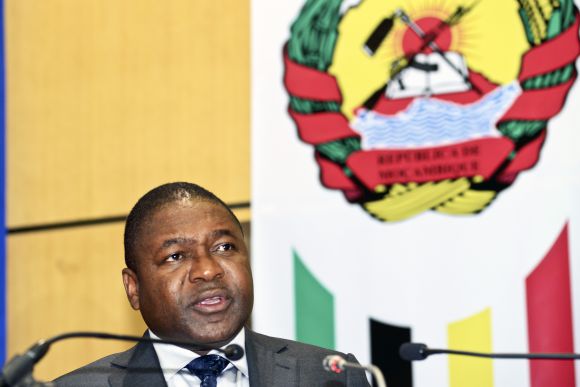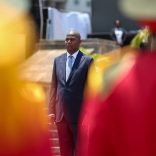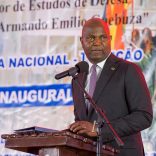Mozambique: Govt preparing human rights report for delivery to UN in January
Nyusi Pledges Fidelity To Commonwealth Values

In file Club of Mozambique / Filipe Nyusi, president of Mozambique.
Mozambican President Filipe Nyusi declared on Sunday that Mozambique will continue to be guided by the values and principles of the Commonwealth, seeking to promote an atmosphere conducive to peace, security, good governance and sustainable development.
Speaking at a press conference in Valletta, where he had attended the Commonwealth summit, Nyusi claimed that the values of the Commonwealth “fit perfectly into our programme of governance, and questions concerning peace, the separation of powers, and sustainable development are matters which are in alignment with our programme”.
His participation at the summit, he added, served to reaffirm Mozambique’s commitment to the principles of the Commonwealth, which it had joined in 1995.
Nyusi took part in the retreat of the Commonwealth leaders at the St. Angelo Fortress, where they were able to discuss, in an open and spontaneous way, the problems of concern to the member states and attempt to identify solutions . The questions discussed included migration, extremism and terrorism.
“There were many contributions seeking to avoid the perpetuation of this problem”, said the President, adding that Mozambique took the opportunity “to express our solidarity with what is happening in the world with regard to terrorism”.
The Commonwealth, said Nyusi, “is a forum which brings universal experiences from many continents and this miscellany of ideas helps greatly for us to evolve as states and nations”.
Nyusi said the summit was also marked by discussion of the preparation of the summit on climate change which begins in Paris on Monday. The leaders endorsed a strong message to the Paris meeting, at which Mozambique will be represented by Prime Minister Carlos Agostinho do Rosario.
The summit’s statement on climate change described it as “an existential threat” to many Commonwealth member states and called for the Paris gathering to produce “an ambitious, equitable, inclusive, rules-based and durable outcome … that includes a legally binding agreement” to reduce greenhouse gas emissions.
The Commonwealth leaders also called for developed nations to spend 100 billion US dollars a year by 2020 to help developing countries deal with the effects of climate change.
The final communiqué from the summit declared that “radicalisation, violent extremism and terrorism in all its forms and ramifications are serious threats to the whole world” and called upon Commonwealth members to fully implement United Nations resolutions on terrorism as well as “national strategies to counter radicalisation, violent extremism and terrorism” including education and the addressing of grievances and alienation by susceptible individuals, particularly young people.
The leaders also believed “that it is imperative to counter the use of the internet by extremist groups to radicalise and recruit fighters”.
A new unit of experts to counter extremism will be set up, run by the Commonwealth Secretariat, which will combat radicalisation and terrorist recruitment across the Commonwealth. The Communiqué also encouraged all countries to accede to and fully implement the 2014 Arms Trade Treaty in order to curtail the illicit trade in conventional weapons including small arms.
The statement declared that “Migration, if properly harnessed and managed, can deliver economic and social benefits which improve the resilience and prosperity of Commonwealth member states. We underlined the importance of safe, orderly and regular migration and of ensuring full respect for human rights and the humane treatment of all migrants as well as refugees and displaced persons.”
The summit “agreed to enhance national and international efforts to address the causes of irregular migration. We are deeply concerned by the increase in flows of refugees, asylum seekers and irregular migrants which entails suffering, abuse and exploitation, particularly for children and women, and unacceptable loss of life”.
The Commonwealth leaders “agreed to enhance national and international efforts to address the causes of irregular migration including prevention and abatement of conflict and violent extremism and terrorism; eradicating poverty and promoting sustainable economic development; strengthening the rule of law; nurturing inclusive and pluralist political systems; combatting organised crime, human trafficking and people smuggling, and modern day slavery; and reinforcing respect for human rights”.
The summit elected Baroness Patricia Scotland, who was born on the Caribbean island of Dominica, but has lived in Britain for most of her life, as the new Commonwealth General Secretary, to replace Kamalesh Sharma, who is retiring in April 2016, at the end of his second term of office.
Baroness Scotland was a Minister of State in the British Home Office from 2003 to 2007, and then Attorney-General from 2007 to 2010.
She won after two rounds of voting, defeating Mmasekgoa Masire-Mwamba of Botswana, who had been the Deputy General Secretary for Politial Affairs, and was supported by other Commonwealth members from the SADC (Southern African Development Community) region. She is the first woman General Secretary of the Commonwealth.












Leave a Reply
Be the First to Comment!
You must be logged in to post a comment.
You must be logged in to post a comment.